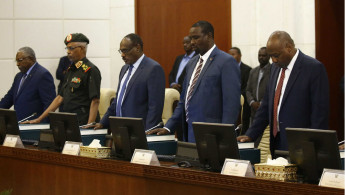Sudan swears in new 21-member cabinet
Sudan's new 21-member cabinet was sworn in on Saturday, with the country's prime minister also assuming the finance portfolio after an appointee formally declined the post.
Sudan has been grappling with an acute foreign exchange shortage and massive inflation hovering around 65 percent, prompting President Omar al-Bashir to sack the previous 31-member cabinet last Sunday.
Bashir had initially nominated Abdallah Hamdok as the new finance minister, but Sudan's official news agency SUNA reported earlier on Saturday that Hamdok had "apologised" and declined.
"After consultations with Prime Minister Moutaz Mousa Abdallah, President Bashir decided that the prime minister will hold the finance portfolio," the presidency said in a statement on Saturday.
Later the new, smaller cabinet took the oath of office at the presidential palace.
Bashir said the people of Sudan had "high hopes" from the new government.
Twitter Post
|
"One of the biggest challenges for the new government is to resolve the economic issues," Bashir said in a separate statement after the swearing-in ceremony.
"I'm fully confident that the ministers will use Sudan's resources efficiently to solve the economic problems."
Several ministers from the previous government have been retained in the new cabinet, including the foreign and oil ministers who were appointed only months ago after an earlier cabinet reshuffle.
Mousa Abdallah himself was irrigation minister in the previous cabinet.
Sudan's economic crisis has only worsened this year despite Washington lifting its decades old embargo on the African country last year.
Food prices have more than doubled, fuel shortages have become frequent and the Sudanese pound has plunged against the US dollar amid shortage of foreign currency.
The surging prices triggered sporadic anti-government protests in January in Khartoum, but the authorities swifty moved in, arresting several activists and opposition leaders.
Even as Washington lifted the sanctions last October, it kept Sudan on its list of "state sponsors of terrorism," a factor officials say keeps investors away and halts the country's economic revival.
Sudan's economy was dealt a severe blow initially from the loss of three-quarters of its oil resources when South Sudan gained independence in 2011.
An attempt in September 2013 to cut fuel subsidies led to bloody confrontations between anti-austerity protesters and security forces that left dozens dead in Khartoum.
Bashir came to office in 1989 after orchestrating a military coup against the democratically elected Sadiq al-Mahdi. Since then, he has won office three times in elections rights groups say were neither free nor fair.
Last month, Sudan's ruling party said it chose Bashir to run for a third elected term in 2020, despite the constitution only allowing two five-year terms.
Agencies contributed to this report.





 Follow the Middle East's top stories in English at The New Arab on Google News
Follow the Middle East's top stories in English at The New Arab on Google News
![Israeli forces ordered bombed Gaza's Jabalia, ordering residents to leave [Getty]](/sites/default/files/styles/image_330x185/public/2176418030.jpeg?h=a5f2f23a&itok=_YGZaP1z)

